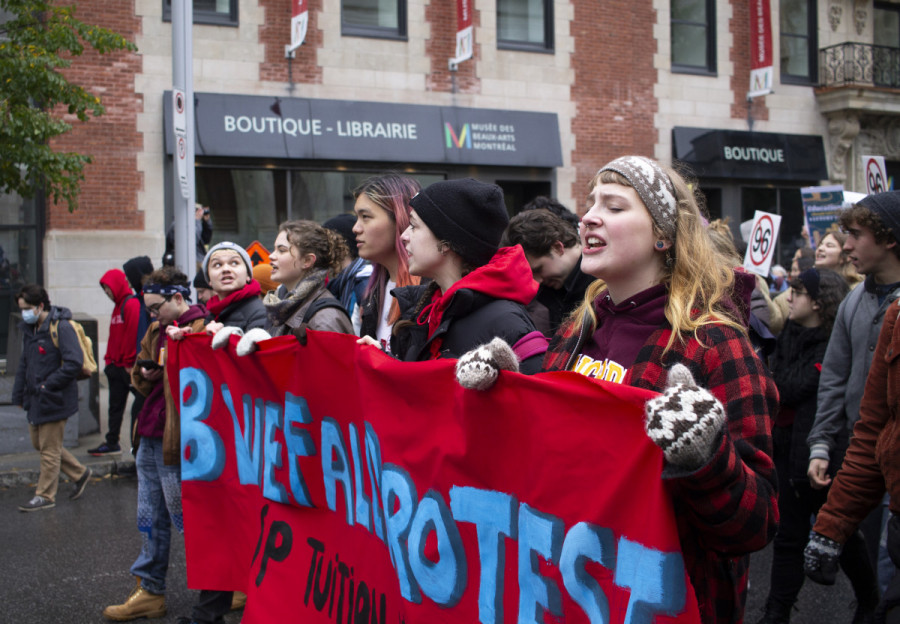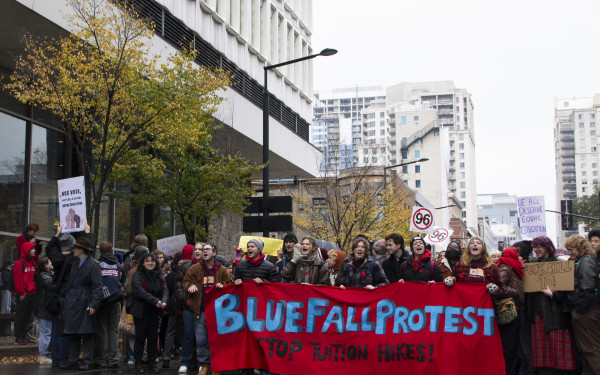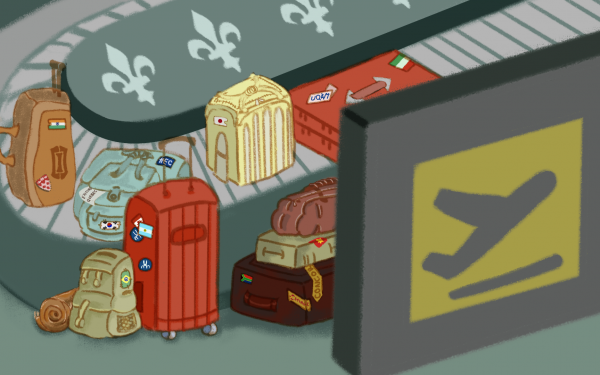Montreal students and faculty rally against tuition hikes
Concerns regarding enrollment, funding and multiculturalism fuel pushback
On Oct. 13, the Coalition Avenir Québec (CAQ) announced that tuition would greatly increase for out-of-province and international students studying at English universities in Quebec in fall 2024.
The government will double the tuition for incoming out-of-province Canadian students, as well as require universities to pay $20,000 for every international student enrolled. The money will be used by the government to support francophone universities.
Currently, Concordia students have three tiers of tuition rates. According to the Concordia Student Union (CSU), Quebec residents pay $90.84 per credit, out-of-province students pay over triple their rate at $283.52 per credit, and international students pay $790 per credit. With a full course load of 15 credits, one semester of tuition is respectively $1,362.60, $4,252.80 or $11,850, before other university fees and expenses.
French language minister Jean-François Roberge argued that these tuition hikes are measures to protect the French language in Montreal, a city he deemed “too anglicized.”
However, not everyone agrees with this sentiment. “Anglicization is actually an irrational fear that is used to mask not only the prohibition of education to poorer individuals but also to the broader English-speaking community,” said Alex O’Neill, a co-organizer of the Blue Fall protest against these tuition hikes.
The CSU, the Students’ Society of McGill University and the Bishop's University Students' Representative Council are all supporting the protest, alongside two student associations from the Université du Québec à Montréal: the Student Faculty Association of Political Science and Law and the Student Faculty Association of Science and Education as well as their sub-organizations, who are joining in solidarity.
On Oct. 26, Concordia English professor Nathan Brown published an open letter in support of the protests, criticizing Concordia’s Office of the Provost for their statement discouraging staff from participating. “I think that was a missed opportunity,” he said, adding that it is an issue that students, staff, faculty and administration should be united on. “I think we should be doing everything we can, at every level, to push back against this legislation.”
Brown isn’t the only Concordia staff member to voice their concerns. Jarrett Carty, the liberal arts chair at Concordia, expressed his severe concern about how this will affect his department.
In an email correspondence to the Liberal Arts College, he stated that “there are simply no sound arguments or evidence behind this announced policy,” describing the potential effects as “utterly devastating” to specifically Bishop’s and Concordia. He noted that the immediate drop of students will severely impact Concordia’s Liberal Arts College, where out-of-province students make up 30 per cent of enrollment each year.
“The fact that the universities only found out with the public is an issue of itself. There’s no transparency, there’s no clear communication,” said Noah Sparrow, another co-organizer of the Blue Fall protest. Since the government's announcement, the specifics of how this will affect certain groups is still unclear.
While it is reported that this will not affect research-based masters or PhDs, O’Neill is not convinced. “The word on the street is that they won’t be, but there are certain elements that are being communicated directly to the universities that conflict with that statement,” he claimed, mentioning what he has been told by an employee at McGill.
“There’s obviously a specific intersectional racial element to it,” O’Neill said. “We’re talking about the Middle East—specifically North Africa—as well as the French Caribbean, where there is cultivated talent. There are diverse perspectives that are obviously going to be afforded to other parts of Canada […] if this policy passes.”
Yasmine Wagdy, a prospective Concordia international student and fluent francophone, had hoped to start at Concordia next fall but is not sure if she will be able to. “I don’t really have a plan for what I’m going to do now […] because if they do double the tuition I don’t think I’ll be able to go,” she said.
A report by the CBC highlights that it is difficult for immigrants to learn French in a six month period of time. “I think French is a beautiful language, I speak French constantly and I think people around the world recognize that French is a nice language to learn,” said Davoc Beaupré, a francophone Concordia student. “I think that people are naturally curious, given the time and opportunity to be able to. I don’t see how you can twist [this policy] around to make it positive.”
English universities’ reactions to the tuition hikes could potentially limit current or potential students’ opportunities to learn French. McGill announced the suspension of a $50 million dollar plan to improve the French skills of its students and faculty, citing difficulty finding funding following the announcement of the hikes.
Bishop’s has stressed that the increase in tuition will have a major impact on the school, as a third of its student body is from outside Quebec.
During a press conference on Oct. 25, Quebec Premier François Legault stated that “the number of English-speaking students in Quebec threatens the survival of the French language,” describing the hikes as being difficult, but ultimately necessary.
“Montreal is an internationally renowned […] city for university students,” said Sparrow, who, along with O’Neill, attributed part of this reputation to the city's multiculturalism. Sparrow added that by virtue of being educated here, he has immensely benefited from Montreal’s cultural diversity.
"I think international students complete the mosaic that is Montreal,” O’Neill said.
Brown is concerned about the announcement’s effects on the city as a whole. “We want that intellectual culture of the city to be as robust as possible and I think this legislation is a really short-sighted threat to that,” he said.
At time of writing, there is no information regarding how the hikes impact current students looking to transfer programs for next fall. Students are required to finish their degree in five years or less in order to retain their current rates.
A walkout organized by O’Neill and Sparrow took place at 1 p.m. on Monday, Oct. 30. The walkout began at Dorchester Square before marching by Concordia and ending at McGill’s Roddick Gates.
This article originally appeared in Volume 44, Issue 5, published October 31, 2023.







